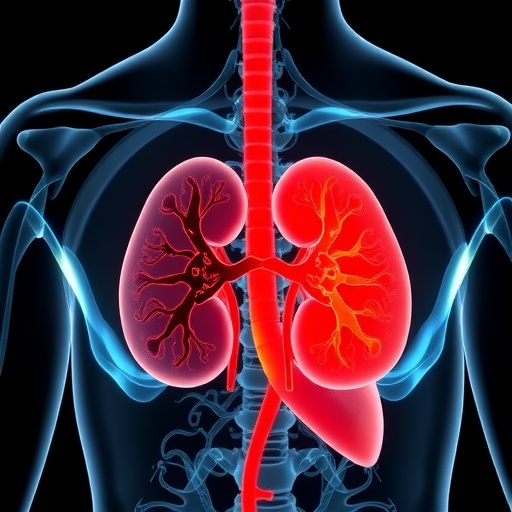In a groundbreaking advancement in the field of transplantation, researchers J.A. Fridell and R.J. Stratta have introduced significant insights into the processes surrounding simultaneous pancreas and kidney transplants, along with the allocation strategies utilized for multi-organ kidney transplants. Their work, published in the current issue of Current Transplant Reports, offers a critical analysis of the complexities involved in these surgical procedures, reflecting a deep understanding of the underlying medical principles and ethical considerations.
Central to the successful implementation of SPKT is the meticulous process of donor organ allocation. The authors elaborate on the multifaceted challenges medical professionals face when selecting recipients for multi-organ transplants. These challenges extend beyond basic compatibility and availability of organs. Allocation strategies must also consider medical urgency, the recipient’s overall health, and the anticipated outcomes based on current medical knowledge. The delicate balance of these factors plays a pivotal role in optimizing patient survival rates and post-surgical recovery.
Ethical considerations are paramount within the scope of organ transplant allocation. The authors discuss how equitable distribution of organs is crucial in fostering trust within the healthcare system. The challenges of prioritizing patients based on varying levels of medical need and societal factors create tension among professionals and the communities they serve. Strategies need to be continually assessed to ensure they align with ethical standards while also considering the evolving landscape of transplant medicine.
Fridell and Stratta delve into the importance of data analytics in refining allocation processes. By leveraging real-time data, healthcare professionals can better predict patient outcomes and the longevity of transplanted organs. Innovations in artificial intelligence and machine learning are key components in this evolving system, enabling more precise allocation and improving the efficacy of multi-organ transplants. This technological advancement signals a transformative era in transplant medicine, highlighting a future where patient outcomes are driven by data-informed decisions.
An additional aspect of this research involves the broader implications for health care policy. With the continued rise in multi-organ transplants, there is a pressing need for policy frameworks that address the logistics of organ procurement and distribution. Effective policies can facilitate communication among various stakeholders, including organ procurement organizations, transplant centers, and regulatory agencies. The authors advocate for collaboration across sectors to streamline processes that ensure more effective and timely organ transplantation.
In discussing the role of multidisciplinary teams in managing the complexities of simultaneous transplant procedures, the authors underscore the need for healthcare professionals from various fields to collaborate. Surgeons, nephrologists, endocrinologists, and transplant coordinators must work cohesively to create comprehensive treatment plans tailored to individual patient needs. This collaborative approach supports not just the technical aspects of transplantation but also attends to the psychological and social dimensions of patient care.
Complications post-transplantation can significantly impact patient recovery, making it vital for transplant teams to implement rigorous monitoring and follow-up protocols. Fridell and Stratta highlight that close observation of patients post-transplantation is essential in identifying potential complications early, thereby minimizing long-term adverse effects. This proactive approach is key to maximizing the benefits of transplants and ensuring that patients can enjoy improved health outcomes.
The authors further address the psychosocial dimensions of transplantation. These aspects play an integral role in patient recovery, influencing adherence to post-operative care regimens and medication protocols. Education and support systems must be established to equip patients and their families with the knowledge needed to navigate the complexities of life post-transplant. By fostering an atmosphere of continuous support, healthcare providers can enhance patient engagement and outcomes.
Additionally, the societal implications of improved transplant methodologies necessitate examination. As successful transplant outcomes increase, the perception of organ donation and transplantation within communities must also evolve. By raising awareness and dispelling myths surrounding organ donation, healthcare providers can cultivate a culture that encourages more individuals to consider donating. The authors argue that such cultural shifts are vital for expanding the pool of available donor organs.
The future of simultaneous organ transplantation looks promising, with ongoing research poised to unveil novel insights that can further optimize these life-saving interventions. As the field progresses, Fridell and Stratta’s research highlights the importance of addressing both the technical and ethical dimensions of transplantation. These insights are critical in guiding healthcare providers through the complexities of organ allocation and improving overall patient care.
In conclusion, Fridell and Stratta’s investigation into simultaneous pancreas and kidney transplantation and its associated allocation methodologies stands to significantly impact the field of transplantation. Their research sheds light on the complexities involved and underscores the importance of a human-centered approach in addressing the intricacies of multi-organ transplants. As healthcare professionals strive to harness the potential of these transformative procedures, the guidance provided by such research will be invaluable to shaping the future of organ transplantation.
By fostering collaboration, utilizing innovative technologies, and addressing ethical and societal dimensions, the field of transplantation is likely to evolve into one that not only enhances clinical outcomes but also enriches the experiences of patients navigating their post-transplant lives.
Subject of Research: Simultaneous pancreas and kidney transplants, multi-organ kidney transplant allocation
Article Title: Simultaneous Pancreas and Kidney Transplant and Multi-Organ Kidney Transplant Allocation
Article References:
Fridell, J.A., Stratta, R.J. Simultaneous Pancreas and Kidney Transplant and Multi-Organ Kidney Transplant Allocation.
Curr Transpl Rep 11, 259–265 (2024). https://doi.org/10.1007/s40472-024-00446-4
Image Credits: AI Generated
DOI: 10.1007/s40472-024-00446-4
Keywords: simultaneous pancreas and kidney transplantation, multi-organ transplant allocation, ethical considerations, data analytics in healthcare, patient outcomes, transplant policies.
Tags: Current Transplant Reports publicationsdonor organ allocation challengesdual organ transplantsend-stage renal disease solutionsimproved patient quality of lifemulti-organ transplant ethicspancreas and kidney allocation strategiesrenal failure managementsimultaneous pancreas and kidney transplanttransplant surgical procedurestransplantation research insightsType 1 diabetes treatment





